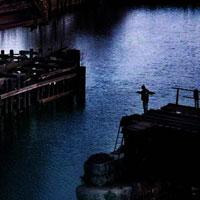Hardcore is a difficult genre to exist in. Fickle fans, guaranteed financial failure and quick stylistic turnovers lead to a short life expectancy for bands. The majority of bands that experience any success burn brightly for a time and fade away quickly or just stagnate, rarely releasing more than a handful of quality records. It's exceedingly rare for a band to grow and improve in an environment crowded with the prevalent "I liked their first 7-inch better" mentality, but when dealing with Blacklisted, these trends simply do not apply.
Blacklisted was already a good band and deservingly popular when they were derailed by sudden health problems and broke up during the `06 Sound and Fury Fest. Then, to everyone's surprise, like some sort of ultra-strength super-zombie, the band arose from its fresh grave as a tighter, bolder and more focused beast capable of incendiary live shows and released the universally praised Peace on Earth, War on Stage 7". A year later, with the hardcore hype machine running on maximum, the question became, "Can Blacklisted keep up with its own momentum?"
Absolutely. With its verbose title and intense blasts of ridiculously powerful songs, Heavier Than Heaven, Lonelier Than God acts both as a continuation of the style found on POEWOS and as a next step for the band, adding a newly displayed 108 and Quicksand influence. As a bonus, there is a clearly enhanced level of musicianship and Kurt Ballou's production actually improves on his work with POEWOS. The band is tighter on the heavy parts and even more manic on the fast parts. They even expand their repertoire with some great textural work on "Circuit Breaker" and some faint Greg Ginn-styled guitar soloing on "Matrimony." This is the record Blacklisted has been hinting they could make.
The album opens with "Stations," starting with a few seconds of guitar noise before one hit and an explosion of speed and aggression. It's followed with a buildup to a completely satisfying and hard-as-fuck groove while frontman George Hirsch sings, "I feel hopeless when I just wish I could feel a little less." As the band has grown tighter and more focused over time, Hirsch has gone through a similar progression. While always having possessed a thick and strong screaming voice, he has elevated his style to consistently include melody. The bluesy inflections he puts over the heavy parts add exponential power over typical straightforward screaming. With more and more hardcore bands like War Hungry or the Mongoloids experimenting with this approach, it can often sound forced and awkward, but Hirsch utilizes it effortlessly and appropriately.
The template for "Stations" remains consistent throughout the album, as the band stays focused and tight while Hirsch publicly addresses his demons. He deals with doubt, ponders insanity and acidicly questions the idea of marriage ("Now that he said âI do,' can you finally please your mother?") before declaring, "I just want to love myself."
Throughout the 11 songs, we witness Hirsch on a quest. Like jazz saxophonist John Coltrane, he never seems satisfied, constantly exploring himself through his work. Coupled with this constant search for self he displays a rare honesty, unafraid to show weakness or strength. He is both strong-willed and undeniably vulnerable. At once able to damn the flaws around him and then turn around and question his own existence. In the A side closer, "Circuit Breaker," the band breaks down into a rare slow groove as Hirsch tries to convince himself "I have nothing to prove, I have nothing to prove." This may or may not be true, but damn if it isn't powerful.
With eight of the 11 tracks clocking in at less than two minutes, the band displays a knack for getting to the point. Some fans may be dismayed at the album's length, but the band actually proves itself as an expert at self-editing. Every riff is set up the right way and played for just the right amount of time. They say what they came to say and get out. This lends itself to a profound effect on the listener and to added replay value.
What ultimately separates Blacklisted from the rest of the pack of contemporary hardcore bands is their approach. They don't try to write the hardest riff or the cleverest lyric. They don't worry about what that the kids in the flat-brimmed hats with arms crossed at the side of the stage will think of them. Instead, they just go for it, creating music rooted in emotion, exorcising their demons and transcending the narrow confines of their genre. Acting coaches are commonly heard to utter the directive "commit" to aspiring thespians that can't break through the barrier of real emotional performance. In this sense, Blacklisted "commits" like few others in heavy music.
